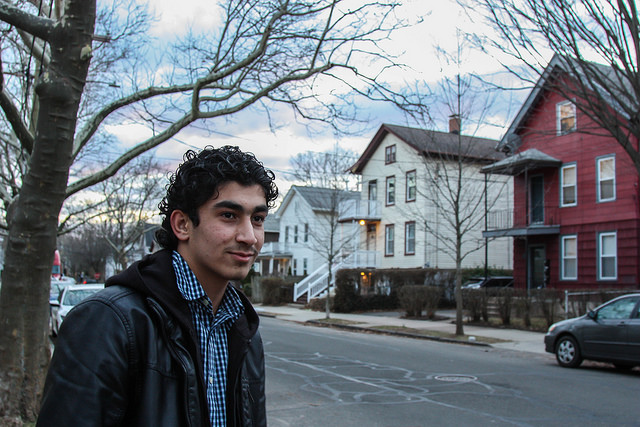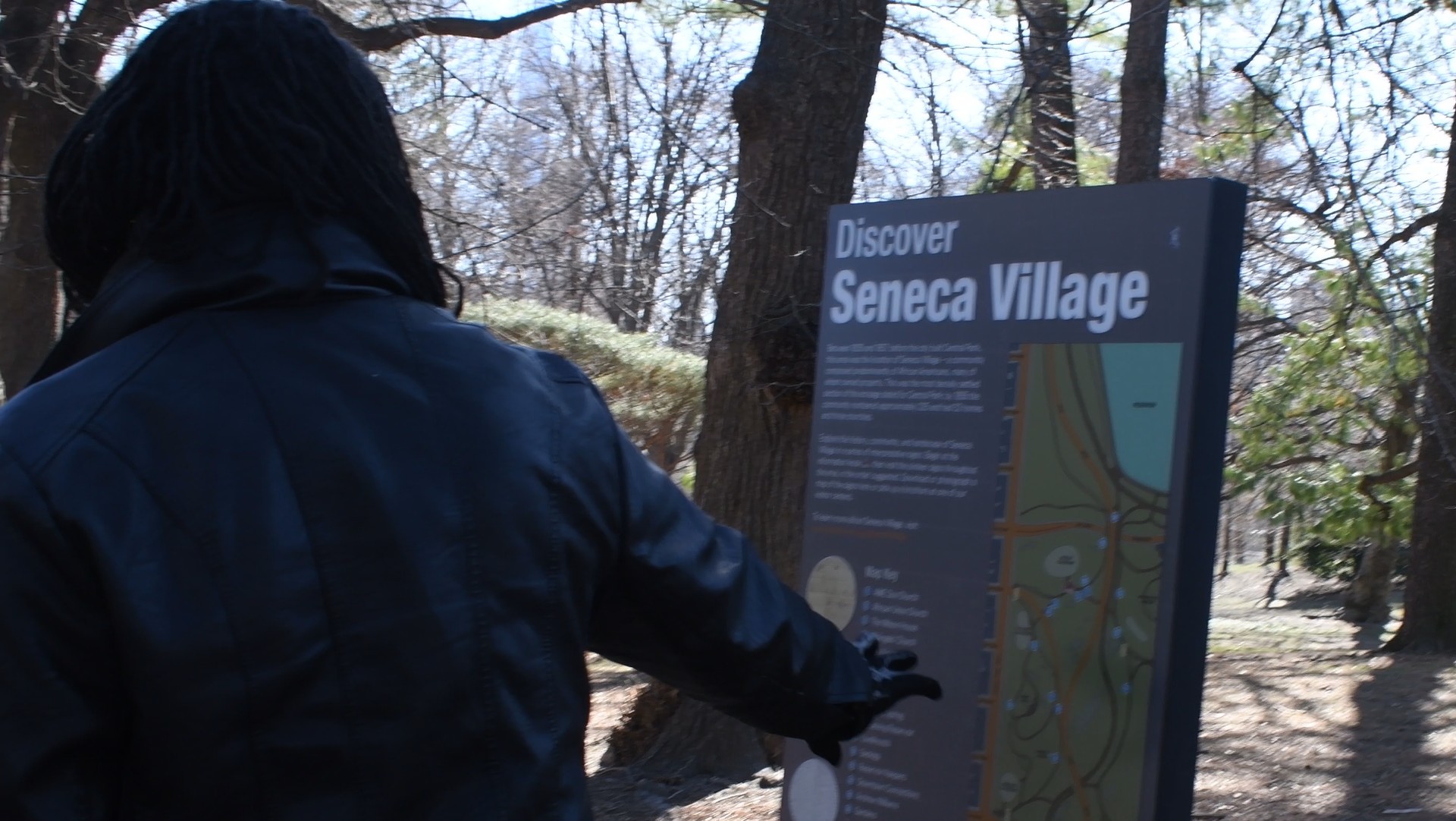Omar Moussa, 17, a block from his house in New Haven, Connecticut, Photo by Stella Levantesi
Omar Moussa kicked off his black, worn out sneakers. He left them outside his front door, like he does every day when he gets to his home in New Haven, Connecticut. Moussa, 17, a Syrian refugee, is one of 12 siblings, and unlike many kids his age, he works most nights to help support his family.
“A lot of my friends see that I’m tired at school and I don’t really have to time to hang out with them after class or focus on my homework,” said Moussa. “Sometimes I feel like I would just like to study, but at the same time I’m happy to work and to help my family.”
Back in 2012, war, violence and persecution forced Moussa’s family to flee Syria for what they hoped would be a better life in Jordan. Since the beginning of the war, more than 400,000 Syrians have been killed.
Moussa was only 11 when he started working. He worked so much sometimes he didn’t see his family for days.
“In Jordan, as Syrian refugees, we had no future,” said Moussa. “I was working 17 hours a day for very little money. It was a hard life. But we needed the money.”
But in Jordan, even if the Moussa family was safe from war, life was far from perfect.
“The people treated us really badly in Jordan and we knew they didn’t want to accept us, said Moussa. “But we couldn’t go back to Syria. It was too dangerous. ”
According to the UN Refugee Agency, the crisis in Syria has displaced more than 5.2 million people, who poured into the neighboring countries, specifically Turkey, Lebanon and Jordan.
“I walked to Jordan, and it took 8 hours. We had kids and old people,” said Moussa. “We couldn’t actually go legally because the Syrian government would arrest us. They don’t want people to escape. Thank god they didn’t see us because they would’ve killed all of us.”
In Jordan, Moussa and his family lived in an unhealthy, dirty and overcrowded refugee camp for a while.
“I was sick, and there were a lot of other people who were sick too,” said his mother, Afeefa Moussa in Arabic. “The disease was spreading so we had to leave the camp.”
When they moved to the city, Moussa and his family walked around the streets for hours, going into supermarkets and shops asking if anyone knew of a house they could live in.
“When we finally found a house we had to sleep on the floor for weeks until we finally worked and had money to buy furniture and other things,” said Moussa. “So it was a big difference.”
The procedure to gain refugee status in the U.S. took a year and half. When it was finally approved two years ago, Moussa left Jordan for New York with only part of his family. His two brothers Rasme, 19, and Khaled, 9, his sister, Heba, 15 and his parents, Afeefa and Sami Moussa, made the trip, but eight siblings were left behind.
When the Moussa family arrived in the U.S., they were welcomed by the Integrated Refugee and Immigrant Services, or IRIS, a Connecticut-based nonprofit organization that helps refugees with housing, education, legal assistance, jobs and healthcare.
“When we got to New York, we were so tired and sleepy and sad, but they found a house for us,” said Moussa. “Everything was in the house, food and furniture. We didn’t expect that.”
After two months in the States, Moussa went back to school.
“I had no idea how school was going to be,” he said. “For five years in Jordan I didn’t study, so I had to integrate from 5th to 10th grade. That was a big jump, especially since I didn’t know the language.”
Everyday Moussa juggles school and his job in the restaurant at the New Haven Lawn Club. He goes to school from 7 a.m. to 2 p.m. and then starts work at 3 p.m. His shift usually ends at 11 p.m. or midnight.
“It’s hard because I have school in the morning and my job at night,” said Moussa. “So I don’t have time to study. But at the same time I have to work because I have to help my family.”
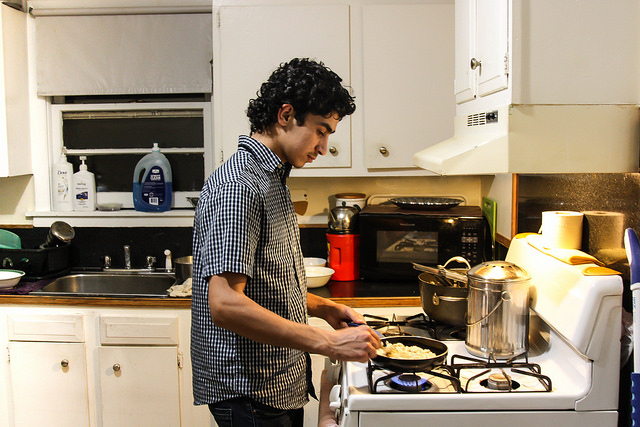
Omar Moussa cooking peanuts in the kitchen, New Haven, Connecticut. Photo by Stella Levantesi
Coming to the U.S. has been a chance for the Moussa children to get the education they lost growing up in a war zone.
“In America there is a lot of chance to have a good future, to have a good life.” Moussa said.
The initial struggles to settle down in their new home were mostly tied to language. Afeefa and Sami Moussa struggle to speak English. Only Arabic is spoken at home.
“The hardest thing was communicating with the American community and friends,” said Sami Moussa. “The first time I applied for a job, they said no because of my English.”
It was dinner time at the Moussa’s home recently. An Egyptian TV show was on. Sami Moussa was on a cell phone talking to his niece in Jordan. They have not seen her for two years and have no idea if they will ever see again.
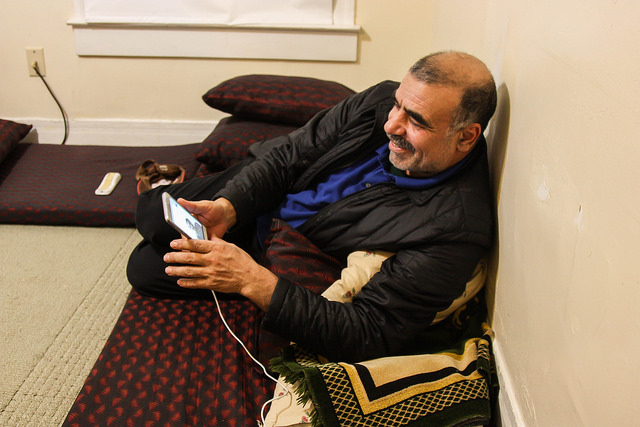
Sami Moussa on a video call with family Jordan, New Haven, Connecticut. Photo by Stella Levantesi
In their kitchen, Heba and Afeefa Moussa were chopping vegetables in matching brown, animal print hijabs. The aroma of Middle Eastern spices filled their home.
Dinner was served on the floor. A dozen bowls and plates with white rice, lentil soup, minced beef and salad lay on a purple tablecloth in front of low mattresses where the family sat. For Moussa this dinner was special. It’s unusual for him to be home for dinner. Before the after dinner tea was served on a tray, a friend of the family, Cathy Shufro, joined them.
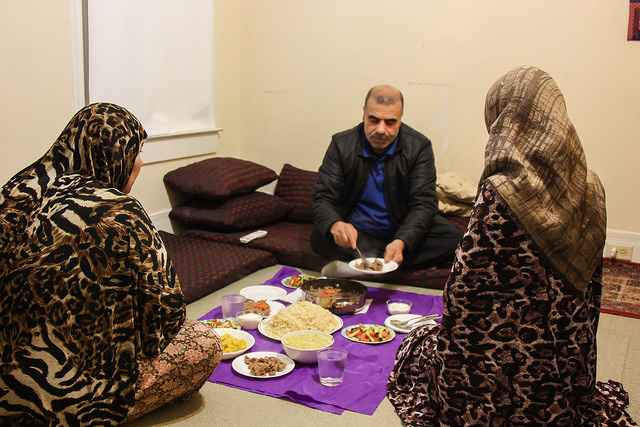
Sami Moussa, his wife Afeefa sitting down to have dinner in New Haven, Connecticut. Photo by Stella Levantesi
“Cathy, you know I got my driver’s license?” said Sami Moussa, mentioning he wants to try and work as an Uber or Lyft driver at night to make more money.
But their life in Syria is always on their mind. Sami Moussa and his older sons were managers in construction and had two farms with animals.
“In my family, we talk about Syria all the time, like every day, because we had a really nice life before,” said Moussa. “It’s been hard.”
Today, the Syrian government is still shelling the area where Moussa’s sister lives and it’s getting increasingly difficult for them to communicate.
“They are bombing every day where my sister is,” said Moussa. “They don’t have internet, and if they want to (have it) it’s so expensive, so we can only talk like once every two months, on the phone.”
For Sami Moussa it’s very hard to see news about Syria.
“I can’t read, and I can’t watch. It’s too painful,” said Sami Moussa, “I don’t want to remember.”
Although a UN commission of inquiry proved that all parties to the conflict have committed war crimes, including murder, torture, rape, and use of chemical weapons on civilians, to Moussa, the Western world seems to be numb to the incessant violence on Syrian people.
“It makes me angry because there are kids and women and everyone’s dying and no one cares,” said Moussa.”
The Trump administration has declared it will allow no more than 45,000 refugees in the U.S. during the current fiscal year, which started in October 2017 and will end in September 2018. This is the lowest cap since Congress passed the Refugee Act in 1980, and it’s a 59% reduction from Obama’s quota, which had set the ceiling at 100,000 refugees.
“It’s shameful that Trump has decreased the refugee quota to the lowest it’s been in decades during a global refugee crisis,” said Zeenie Malik of IRIS. “His reasons are unfounded, unconstitutional, and do not make the US safer.”
Moussa’s sisters are trying to come to the United States, but with Trump’s anti-immigrant policies, it’s not clear what will happen.
“My sister in Jordan and my sister in Lebanon applied to come here, but then Trump stopped the procedure,” said Moussa. “This was last year when they stopped setting up interviews and stuff. We are just waiting now. Maybe yes, maybe no.”
In the summer, Moussa would like to go back to Jordan to report on the Syrian refugees’ condition, but needs to save up to buy a camera and a plane ticket. In the meantime, he received a scholarship for summer school in D.C., which might help make his dream come true.
“I’m trying to study social work right now,” said Moussa. “I like to work with the community and listen to their problems. I want to help people out, like IRIS did with us.”
